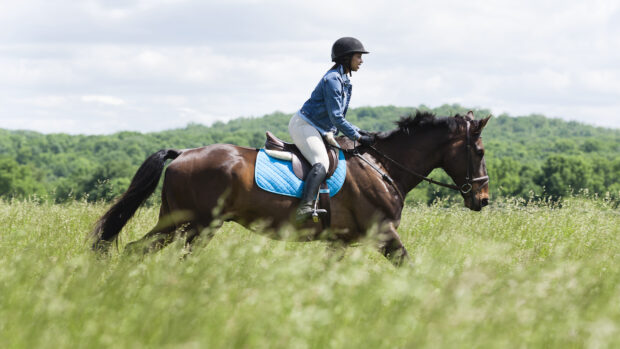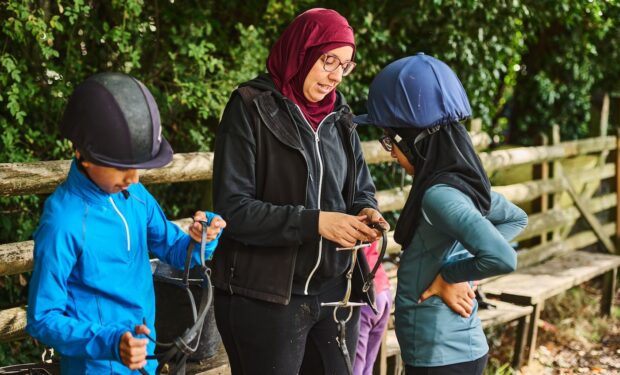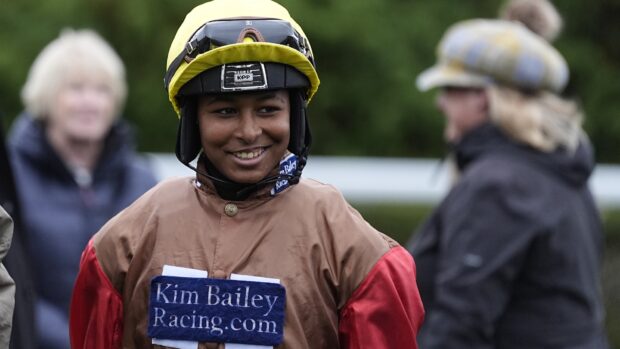A RIDER who started a clothing brand aged 17 hopes her success will encourage more people of colour into equestrianism – as work continues to increase the industry’s diversity.
Caroline Ogunshola (pictured, left) was 17 when she founded Lusso Equestrian Apparel, which grew to a five-figure turnover in its first year.
Caroline told H&H she started riding aged 10, near her home in London.
“I was very lucky; it cost £8 for a weekend, so you’d get there at 9am, help out and ride for half an hour. Any more than that and I couldn’t have done it,” she said, adding that horses had to take a back seat while she studied for her A levels and then a business admin apprenticeship.
“But horses have always been a big part of my life and during the first lockdown, I started watching things like Heartland,” she said. “It made me want to start again but everywhere was closed so I decided to use my interest to start a business, just to reconnect.”
Caroline watched countless YouTube videos and used money she had saved for a car, doing everything from creating her logo to designing her website.
“My driving test kept being cancelled because of Covid; it was like everything aligned,” she said. “I had no design experience, just thought about what I wanted and was needed, and it was good riding leggings, which were comfortable. My brand is about a luxury feel without the price tag, comfort and, most importantly, trying to build a community.”
Caroline said once she had created her products, she needed pictures, but did not want to model herself.
“You don’t see many people of colour riding, and I thought people might judge, and think I didn’t know what I was doing, or my clothes were no good,” she said. “I tried to hide that the person behind it was a person of colour.
“Then I read about Khadijah [Mellah] and found Ebony Horse Club, and thought, ‘This is exactly what’s needed.’ I realised I wasn’t helping by doing what I was doing.”
Caroline says people are “taken aback” by the fact she rides, but she wants to encourage more people of colour into the industry, into riding and also careers.
“I think people want to be involved but think they can’t as they don’t see others who look like them,” she said. “My video did start a conversation and I think there need to be more, even if they’re uncomfortable.”
Caroline hopes imagery such as hers, using herself and her sister Toni, who also rides (pictured, right), will help.
“I hope other people will see it and think, ‘I can do that,’” she said. “I’m proud to have become a business owner and even more proud to pave the way for other ethnic minorities to enter this industry.”
Linda Greening, head of inclusivity at Hartpury University, spoke on diversity in relation to the staffing crisis at the National Equine Forum (3 March) as part of her aim to “keep inclusivity on the agenda”.
She told H&H of recent developments, including British Equestrian’s (BEF) programme for coaches in urban riding schools and its invitation to tender for research to help “understand the barriers to making equestrian activity more inclusive and representative of the UK population”.
She added that joint work between land-based colleges to encourage people from under-represented communities into the industry had stalled somewhat owing to a Government change in focus to outreach teams going into schools, and efforts to maintain momentum are ongoing.
Miss Greening agreed raising awareness of the range of jobs in the industry, as well as riding, is key, adding that she has tendered for some research on increasing diversity in equestrian post-graduate studies, for example.
“There’s definitely movement and momentum,” she said. “Everyone is mobilising, which is really good, and we’ve got to keep it on the agenda so people keep talking about it.”
Miss Greening added that the industry has to be a welcome place for all in it.
BEF head of participation Mandana Mehran Pour told H&H the BEF is “committed to making equestrianism more inclusive and accessible”, and continues to focus on equality, diversity, and inclusion (EDI). She said the research open for tender, on behalf of BEF members, focuses on people from ethnically diverse communities and low socio-economic backgrounds.
“The outcome will help us shape an EDI strategy, to be developed with federation members,” she said. “We are all committed to make our sport diverse, inclusive, and welcoming to people from all backgrounds. The BEF is taking leadership in this area on behalf of the federation, and we’re also linked with the British Horseracing Authority and will collaborate more closely with it and its stakeholders.”
Ms Mehran Pour agreed that the focus is not just on riding but the huge range of activities people can be involved in within equestrianism, “from volunteering at a riding school or event to the career opportunities available”, adding that a report is also due to be released on diversity within the BEF workforce.
She said the Government is encouraging sporting governing bodies to address diversity, and people’s experiences in sports, and that the BEF will commit to “harness a culture of everyday inclusion to enable us to make real headway towards tackling inequalities within our ecosystem”.
The BEF also plans to carry out research aiming to develop urban equestrianism, working with urban riding schools.
You might also be interested in:

New coaching scheme aims to transform lives

Great work ongoing to boost industry’s diversity

Sex harassment ‘epidemic’ and lack of diversity must be tackled for sport’s future

Subscribe to Horse & Hound magazine today – and enjoy unlimited website access all year round
Horse & Hound magazine, out every Thursday, is packed with all the latest news and reports, as well as interviews, specials, nostalgia, vet and training advice. Find how you can enjoy the magazine delivered to your door every week, plus options to upgrade your subscription to access our online service that brings you breaking news and reports as well as other benefits.




